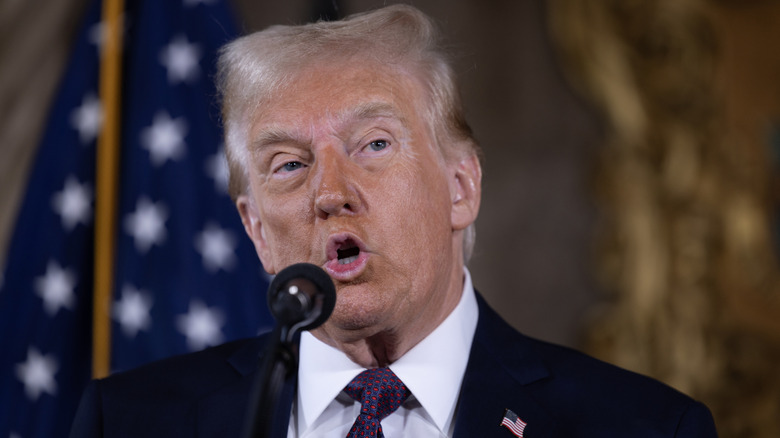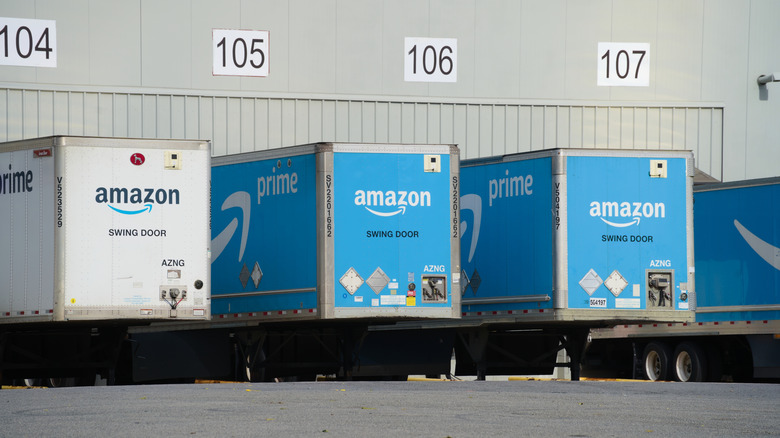Donald Trump's Proposed Tariffs Could Have An Affect On Amazon Shoppers
Citizens of the United States might have a tariff-shaped headache right now, and soon it might get worse for those who are also Amazon shoppers. President-elect Donald Trump has pushed extreme tariffs throughout his most recent presidential campaign. In the days leading up to his criminal sentencing and presidential inauguration,he even called a report by The Washington Post (a publication owned by Amazon executive chairman Jeff Bezos) inferring that his actual tariff plan would be far less aggressive than his fiery campaign promises "Fake News."
Trump the "Tariff Man's" adamant stance on tariffs as a source of federal revenue and global power could mean 60% tariffs levied against China might be more reality than rhetoric. Even tariffs increased by 20-30% would impact much of global trade, and stand to affect the price and product availability of Amazon goods reliant on China-based suppliers and Amazon sellers.
Americans used to adding affordable merchandise to their Amazon carts might experience more than a bit of sticker shock at checkout, come Trump's second term. Or perhaps Amazon shoppers won't experience much sticker shock at all, if certain exceptions (or evasions) are made to new tariff rules. Time, tariff policy, and tricky tariff-evasion tactics will tell — while Amazon shoppers try to stock up on deeply discounted headache medicine in the meantime.
What products might be most affected
Amazon is known for its low pricing, and many things sold on Amazon could be affected by new tariffs. The world's largest e-commerce retailer makes money selling everything across channels including Amazon Prime memberships and Amazon Fresh grocery subscriptions. However, retail is the primary way Amazon makes money, and the company relies heavily on China to do so.
Per data analysis from e-commerce business intelligence firm, Marketplace Pulse, over half of Amazon's top 10,000 sellers are based in China, and therefore account for half of the company's third-party gross merchandise value (GMV), or the value of goods sold through Amazon. Compare this 50% stronghold to U.S.-based companies making up for 30% of product sold on the site. In 2023 alone, Amazon's GMV was $480 billion dollars, so taking the statistics into consideration, about $240 billion worth of merchandise sold via China-based sellers and vendors may be affected by increased tariffs.
Amazon's Amazon Haul store also stands to be hit hard. Amazon Haul is Amazon's answer to Chinese direct-to-consumer discount marketplace Temu, and largely sources products from China-based manufacturers. Any China-based seller may change their prices or edit offerings once tariff uncertainty clears. As a price follower, Amazon holds less inventory than other lower-cost price leaders like Walmart and Target. This means once their stateside stock runs out of warehouses, price increases due to tariffs could jump up quickly to reflect the new and complicated impact of tariffs.
Why there may be no Amazon tariff effect at all
Tariffs could impact the job market, affect the housing market, and certainly impact the prices of goods we buy from Mexico, China, and Canada. However, there are two ways new tariffs may not affect Amazon shoppers much.
Despite past public feuding between Trump and Bezos, relationships might be patched in 2025 with promises of less regulation on business. Perhaps a long shot, but less regulation may financially balance out tariff-based pricing. Another more likely way Amazon shoppers won't feel price gouged depends on that old favorite play in the great game of money making: trickery.
"De minimis" laws have aided direct-to-consumer stores like Amazon Haul, Shein, Temu, and Alibaba to skirt tariffs in the past, and likely will continue to. De minimis allows overseas sellers to sell direct to individual U.S.-based consumers. Think of this as not buying a product at a dollar store, but instead buying the product from it's China-based manufacturer. Under the de minimis exception, individual consumers are the "importer," rather than a large company, and are allowed to "import" up to $800 worth of goods from foreign countries without having to pay tariffs. Don't get too excited about taking advantage of the largely questionable practice of de minimis, however: cutting out the more traditional shipping and warehousing middle people in favor of Amazon fulfillment centers means lost U.S. jobs, and the potential for lost U.S. income.


